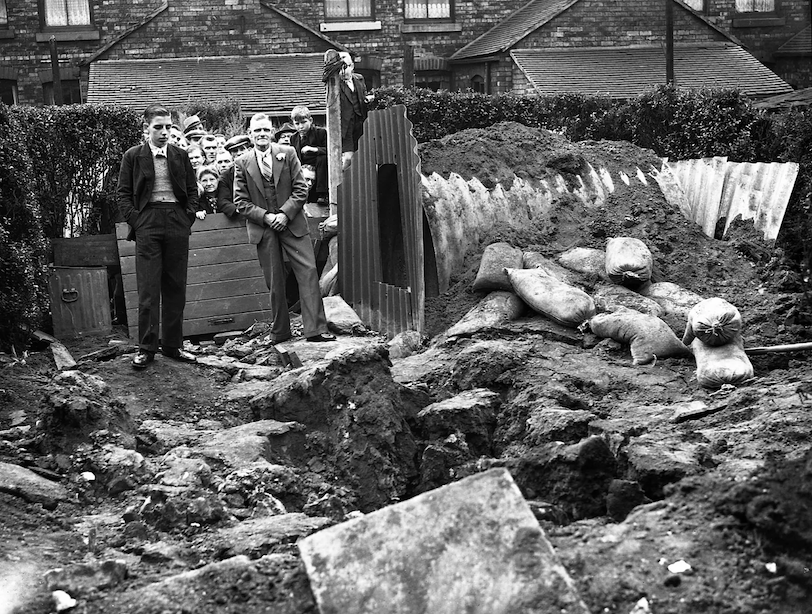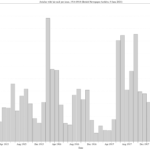
In August 1940, the letter columns of the Stoke-on-Trent Evening Sentinel raged with an intense (if brief) controversy over the existence of unofficial civil defence groups known as ‘street patrols’. These were nothing to do with the national Air Raid Precautions (ARP) organisation, which among other things recruited air raid wardens to monitor and coordinate civil defence responses in their area, both before and during raids. Instead, street patrols involved small groups of residents standing watch at night to make sure that their neighbours were warned of a possible raid, so that they could take whatever steps they felt necessary for their own safety.
Why was this controversial? The basic objections were summarised on 12 August by ‘Light Sleeper’ (not a single letter-writer used their own name, which perhaps suggests the acrimony over the issue):
May I protest against the nuisance created by unattached bands of men arousing people from their sleep with cries of ‘Aircraft over,’ regardless of whether the aircraft is a friendly or enemy plane; and also against the ‘friendly collection’ organised weekly by these same persons, presumably to assist their nocturnal activities?
I think you will agree that my remarks on this subject are fully justified, in view of the established fact that there is no sure method of audibly identifying enemy aircraft.1
It was ‘Some time ago’, according to ‘Audax’ in the same issue, that these street patrols had begun ‘making themselves a nuisance’.1 Indeed, a month earlier, the Sentinel had noted that ‘People of good intention are forming patrols in various areas with the object of warning their neighbours should necessity arise’. Stoke’s Chief Constable and Air Raid Precautions Officer, F.L. Bunn, was reported as informing such ‘helpers’ that ‘they must act only in such a manner as will assist trained ARP workers. They must not, for example, shout or blow whistles’.2 Thomas Lockett, the Deputy ARP Controller for Stoke, claimed that:
Street patrols as such can only serve a limited purpose, but if the members of these patrols will join the wardens’ service and be trained to do their job efficiently, they will be performing a real service to the community.2
So what was the case for street patrols, then? ‘Xadua’ (heh) explained that:
Our men got together and decided to patrol the street, two each night, which they have done for six weeks. Only twice in this time have they got people up. Our women and children got 40 nights’ rest out of 42, which, I think, is pretty good. The women have shown their gratitude by collecting for smokes for the men on patrol, and also have enough money in hand either to buy a stirrup pump or to set up a first-aid outfit. If ‘Audax’ wants his ‘just’ sleep with bombs dropping around, he is welcome to it.3
Patrollers such as ‘Be Prepared’ denied that they were waking anyone who didn’t want to be: ‘The system used by us is private, and does not interfere with those who do not wish to be roused, and so does not constitute a nuisance’.4 There was certainly some support from those they were protecting. ‘Soldier’s Wife’ thought that the patrols were ‘a real good thing’, while ‘One Who Is Grateful’ thought ‘the street patrols worthy of all praise […] carry on lads, do your duty and be British!’5
It’s clear that there was almost as much anxiety around sleeping as around bombing: the controversy was partly those who could not sleep peacefully unless they knew somebody would warn them of a possible raid versus those who could not sleep peacefully because they knew somebody would warn them of a possible raid.
But why was this a problem at all? Surely everyone would be awakened by the (official!) air raid sirens? Nobody is quite addressing this issue, but the answer seems to be that even though the siren system had been installed at Stoke by 1938, with regular tests and refinements in the following two years, they were not yet universally trusted. At the end of June 1940, the Sentinel attempted to dispel the uncertainty:
People can be assured that air raid warnings will be given by the sound of sirens should necessity arise.
Any misunderstanding on the part of the public should be dispelled at once; and it should be realised that too frequent sounding of sirens would not only create needless alarm, but would be helpful to enemy airmen.
The air raid warning system has been established on a well-planned national basis, and the public can have complete confidence in that system and in the civil defence services, which are highly efficient.6
This intervention seems to have had the opposite effect, for a few days later the Sentinel reported receiving ‘a number of letters on the subject of the air raid warning system’, with the following, ‘bearing three signatures’, being typical:
Should sirens be sounded or should they not? There is dissatisfaction with the present system, and the general opinion is in favour of sirens being sounded every time at the approach of danger.
Then the public could, at their own discretion, either seek shelter or remain in bed.7
They acknowledged the risk of losing sleep from false alarms, but felt that:
unless the people are assured that sirens will be sounded every time at the approach of possible danger, they will lose confidence in the warning system and will either lose a considerable percentage of sleep, or, as the Irishman would say, go to sleep half-awake.
Even these individual precautions are of no avail if the enemy airman should coast over an area, in which eventuality, the only warning might be the falling or explosion of bombs. Then it would be too late for the unfortunate people in the immediate vicinity to take effective shelter.7
So the issue here is that the sirens were only going to be sounded when an air raid seemed certain, according to the judgement of the authorities. But some people did not trust this judgement, so wanted to be warned when there was some risk of an air raid, so that they could decide for themselves what to do. This is exactly what the street patrols were for. And indeed, on the very same page, another writer reports that:
We have instituted a patrol of our locality. We commenced last night with eight on patrol, and have received support from all the residents in our area.
If we on duty could receive a signal from the authorities on the approach of aircraft, it would be helpful.7
That’s the earliest evidence I’ve found for Stoke’s street patrols. It seems like a nice, neat story, which exposes different official and unofficial risk calculations and appetites concerning air raids and air raid warnings. However, so far I’ve found very little evidence of other street patrols during the Second World War (some, not none). What I do have is relatively abundant evidence of street patrols during the First World War. (This was the topic of my talk at the AAEH in Auckland a couple of weeks ago, and it was also the topic of a post I wrote on Airminded 15 years ago, though ‘mutual aid’ is a better term for it than ‘self-help’.)
It makes sense that street patrols would be more numerous in the First World War, because civil defence, including air raid warnings, was as yet only rudimentary, and there was much more room for bottom-up approaches, since top-down ones were inconsistent, where they weren’t non-existent. This is something I’ll be looking at in Home Fires Burning; in the meantime, check out Mike Reeve’s Bombardment, Public Safety and Resilience in English Coastal Communities During the First World War for the case of Hull’s street patrols.8
Image source: StokeOnTrentLive.
![]() This work is licensed under a Creative Commons Attribution-NonCommercial-NoDerivatives 4.0 International License.
Permissions beyond the scope of this license may be available at http://airminded.org/copyright/.
This work is licensed under a Creative Commons Attribution-NonCommercial-NoDerivatives 4.0 International License.
Permissions beyond the scope of this license may be available at http://airminded.org/copyright/.
- Evening Sentinel (Stoke-on-Trent), 12 August 1940, 4. [↩] [↩]
- Evening Sentinel (Stoke-on-Trent), 8 July 1940, 1. [↩] [↩]
- Evening Sentinel (Stoke-on-Trent), 14 August 1940, 4. [↩]
- Evening Sentinel (Stoke-on-Trent), 16 August 1940, 3. [↩]
- Evening Sentinel (Stoke-on-Trent), 13 August 1940, 4; Evening Sentinel (Stoke-on-Trent), 16 August 1940, 3. [↩]
- Evening Sentinel (Stoke-on-Trent), 29 June 1940, 1. [↩]
- Evening Sentinel (Stoke-on-Trent), 2 July 1940, 4. [↩] [↩] [↩]
- Michael Reeve, Bombardment, Public Safety and Resilience in English Coastal Communities During the First World War (Cham: Palgrave Macmillan, 2021), 216–226. [↩]





